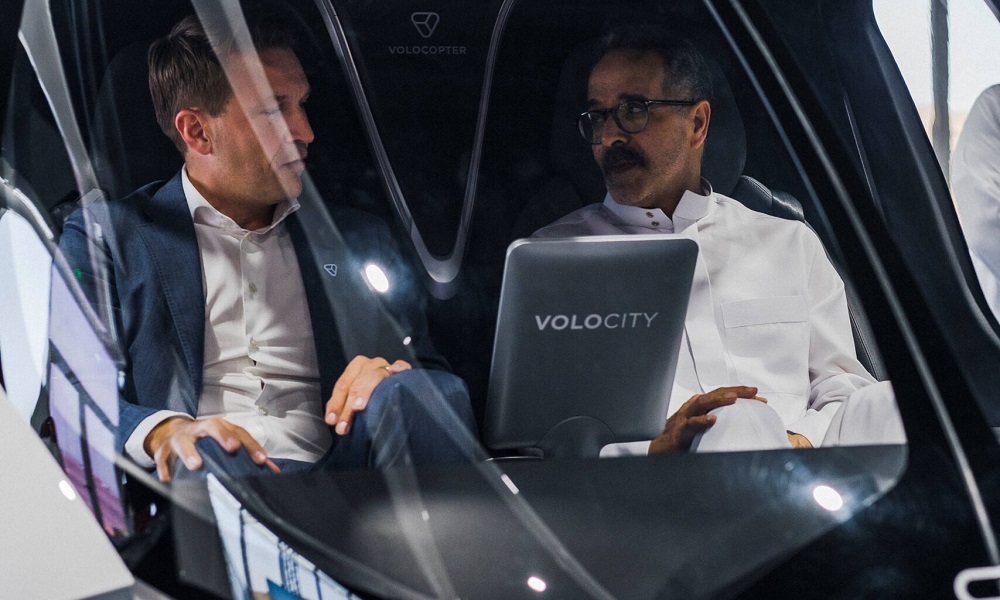First electric air taxi flights in Saudi Arabia are a major milestone, says Serco Middle East
UAM has the potential to revolutionise transportation, making it faster, more efficient, and more sustainable, says Daniel MacGregor, chief growth officer at Serco Middle East

Daniel MacGregor, chief growth officer at Serco Middle East, has described the recent test flights of eVTOL aircraft in NEOM as a “big milestone”.
The joint NEOM and Volocopter Urban Air Mobility (UAM) programme marks the first time an eVTOL (electric vertical takeoff and landing) aircraft has received a special flight authorisation and performed test flights in the Kingdom of Saudi Arabia.
MacGregor commented that the test programme highlighted “the major progress that is being made in the development of UAM. The recent test flights of eVTOL aircraft in NEOM are a big milestone, and they show that UAM is on the cusp of becoming a reality.
He added: “I believe that UAM has the potential to revolutionise transportation, making it faster, more efficient, and more sustainable. eVTOL aircraft are noiseless and emissions-free, making them ideal for urban environments. They can also take off and land vertically, which means that they do not need runways, freeing up valuable space in cities. As the technology continues to develop, UAM is likely to become increasingly popular. It has the potential to transform the way we travel, and it could have a major impact on the future of cities.
Serco was recently awarded the mobility services contract for Red Sea Global where it will oversee the high profile Saudi tourist destination’s zero-emissions transport services.
“Serco Middle East has been has been operating in the air transportation sector since 1947 and is ready to support our clients in making UAM a reality. We are committed to developing and managing the air traffic management systems that will be needed to safely and efficiently integrate UAM into the existing airspace. We are also working to develop the training programmes that will be needed to integrate UAM with traditional air transportation.
“NEOM’s recent achievement in successfully completing a series of air taxi test flights is a significant step forward for the development of UAM in the region. This is the first time that an eVTOL aircraft has received a special flight authorisation and performed test flights in Saudi Arabia.
“This is a major step forward, and it shows that NEOM is committed to leading the way in the development of UAM. We congratulate NEOM on their achievement, and we look forward to working with them to further develop UAM in the region. We believe that UAM has the potential to make a real difference in the way people travel, and we are committed to helping make it a reality.”
The test campaign focused on the flight performance of the Volocopter aircraft in local climate and environmental conditions, as well as testing its integration into the local unmanned aircraft system traffic management (UTM) system.
Volocopter eVTOLs will be key to NEOM’s smart and sustainable multimodal mobility system, which will be powered by 100% renewable energy generated by solar and wind energy sources. They will be used in a variety of roles, including as air taxis and emergency response vehicles, and are quieter, more easily adaptable, and cheaper to operate than the helicopters often employed today. They have a smaller on-ground infrastructure footprint, fewer operating restrictions, and employ smart and autonomous capabilities that ensure both safety and sustained relevance in future contexts.
Nadhmi Al-Nasr— CEO of NEOM commented that the successful test flight of a Volocopter eVTOL is not just another milestone on the journey towards the creation of NEOM’s innovative, sustainable, multimodal transportation system – “it is a tangible example of NEOM as a global accelerator and incubator of solutions to the world’s most pressing challenges. Driving the development of smart, sustainable, and safe mobility systems will improve livability and connectivity in cities around the world and reduce carbon emissions, creating a cleaner future.” for all.”
His Excellency, Abdulaziz A. Al-Duailej— President of the General Authority of Civil Aviation (GACA) of the Kingdom of Saudi Arabia added: “This safe and successful test flight represents an important milestone of the Saudi aviation sector and another steady step towards achieving the aviation sector’s strategy, through innovation and employing emerging technologies to create new industries that contribute to the output GDP and create more jobs. It also confirms GACA’s commitment to enabling the safe integration of innovative air transport patterns that improve the mobility experience of individuals in urban areas and the quality of life in the Kingdom of Saudi Arabia.
“NEOM and Volocopter share a joint vision of creating a better future through innovative, clean technology. As part of a multimodal transportation system, electric air mobility reflects NEOM’s ambition to revolutionize mobility and transform people’s lives. In 2021, NEOM and Volocopter founded a joint venture to scale advanced air mobility, positioning NEOM as a collaborative, global living lab for the future of transportation.
The test flight announcement builds on NEOM’s EUR 175 million investment and joint venture with Volocopter and positions NEOM as a leader in future mobility solutions. Volocopter expects to obtain type certification for its VoloCity air taxi in 2024, enabling future commercial operations. Volocopter recently announced the commencement of VoloCity serial production at its facilities in Bruchsal, Germany, with a capacity to deliver more than 50 aircraft a year.Christian Bauer— Chief Commercial Officer and Chief Financial Officer of Volocopter described the first eVTOL aircraft to ever test in Saudi Arabia as “beyond exciting”.
“We are proud to have lain the groundwork for our future collaboration here in NEOM, he added. “The test campaign focused on the flight performance of the Volocopter aircraft in local climate and environmental conditions, as well as testing its integration into the local unmanned aircraft system traffic management (UTM) system.


























